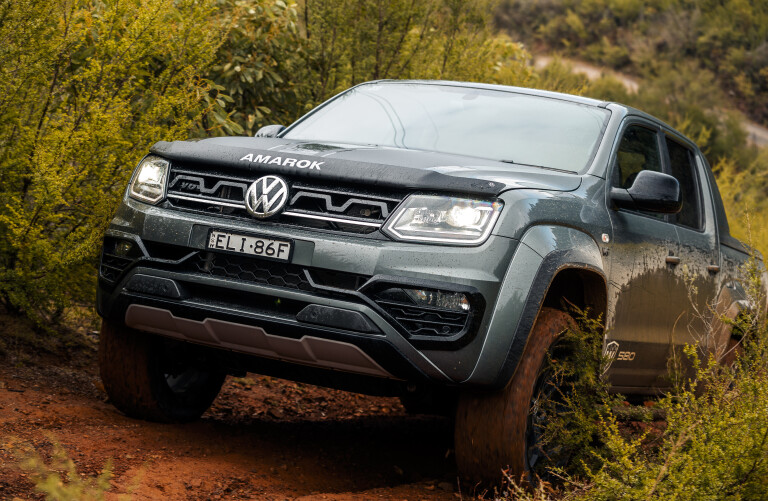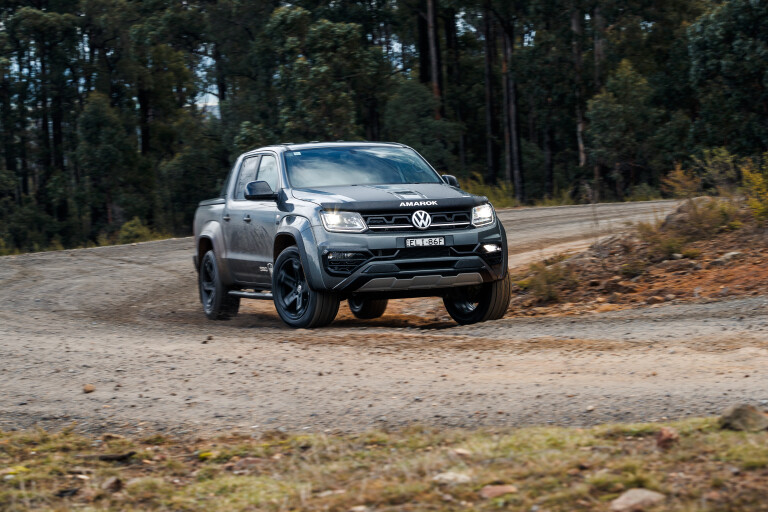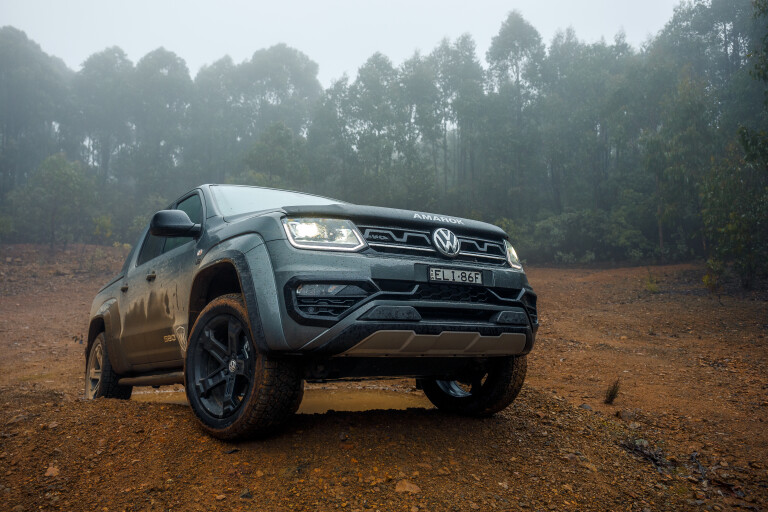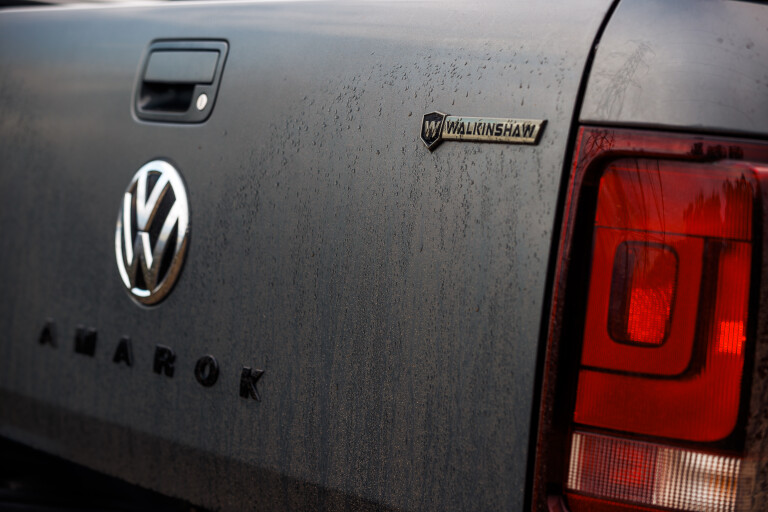
Things we like
- Best-in-class performance
- 580Nm V6 engine
- Well-sorted suspension
Not so much
- Lack of up-to-date safety items
- $80,000 price tag
- Showing its age
Launched in 2010, the Volkswagen Amarok mid-size ute is one of the older vehicles in its class and, rather than investing in an all-new model, VW is partnering with Ford to build the next Amarok on a platform shared with the 2022 Ranger.
Despite its age, the Amarok remains one of the best-driving cars in this segment, with dynamics that leave all competitors behind, and the option of a powerful V6 diesel engine that does the same.
It will be a real shame to lose the Amarok as it’s a unique vehicle in the class, but we wait with interest for the Ford-derived model.
Before that arrives sometime late in 2022, Volkswagen Australia has given its grunty Amarok V6 a performance upgrade by teaming with the engineers at Walkinshaw Performance to make a good thing better. The upgrades made to create the Amarok W580 centre on the suspension and styling, while the powertrain remains the top-specification 580Nm version of the 3.0-litre V6.
The Walkinshaw-tweaked ute is available in two models: the Amarok W580 at $71,990 and the Amarok W580S at $79,990. The vehicles and accessories are covered by Volkswagen’s full warranty.

POWERTRAIN & PERFORMANCE
The Amarok’s V6 engine is already the most powerful and best engine available in the one-tonne 4x4 ute class, so the team decided to leave it alone. This is the top-tune version of the engine that makes 190kW under normal operation but ups that to 200kW on overboost, while the torque is locked in at 580Nm.
In the W580, the V6 is only backed by the eight-speed automatic transmission and full-time, single-range 4Motion four-wheel drive system. With a claimed 0-100km/h dash of 7.3 seconds the Amarok 580 leaves all other factory mid-size utes in its dust.

ON ROAD RIDE & HANDLING
This is where the team at Walkinshaw really went to work on the Amarok. The brief was to create a better GT-style (grand touring) vehicle, and considering the platform was already one of the best for that, they succeeded in upping the ante.
While the Amarok follows the traditional light-truck chassis formula of a ladder frame with a leaf-sprung live axle under the back and coiled IFS up front, VW made it better by equipping its ute with a wider stance that improves both ride comfort and dynamics. VW also offered the option of rear springs that were optimised for comfort or load carrying depending on the owner’s needs.
Walkinshaw widened the Amarok’s track even farther by fitting a set of 20mm offset 20x9-inch forged alloy wheels that take the track out an extra 46mm, front and rear. The wheels wear 275/50 Pirelli Scorpion ATR tyres which in turn take the overall diameter up 20mm for a bit of extra ride height that, with coil spacers also used, combine for a 50mm total lift at the front.

Being forged-alloy wheels, they are lightweight, and the bigger wheel and tyre package is equal to the standard set-up so as not to have any detriment on handling.
New shock absorbers were developed specifically for the model. The twin-tube design shocks are larger with bore size up from 32 to 35mm and the dampener shaft size up from 16 to 18mm. These work wonders to control the wheels as they cross uneven and rough terrain, as well as maintaining a flat and composed ride when cornering.
The Amarok shows its age in that it still has hydraulically assisted power steering, which isn’t an issue; although, it was a bit vague on centre at highway speeds. That could have more to do with the wider tyres than anything else, and it’s a small gripe on an otherwise excellent package.

OFF-ROAD
A lot of people are quick to dismiss the Amarok with an auto transmission as an off-road vehicle because it only has a single-range transfer case – no low range. But the smart boffins at VW Commercial Vehicles tuned the action of the torque converter in such a way that it never really needs a low range ratio.
Sure, it’s not ideal for rock crawling, but in more than 10 years of testing the vehicle we’ve never found the single-range auto driveline wanting in any way; and that includes some steep Victorian High Country drives, where it stayed with the most popular dual-range 4x4 utes on the market.
This puts the auto Amarok in the unique position where you can be touring it down the highway at 110km/h, cross the Murray at Tom Groggin and ascend the steep climb up to Davies High Plain without having to pull a transfer-case lever, turn a dial or flick a switch. It’s off roading as its simplest.

Yes, there is an off-road button which activates the hill-decent control and off-road-calibrated ABS, and another for the rear differential lock, but you would rarely need these functions for general use.
The Amarok’s chassis works just as well as any other mid-size ute off-road in that its wheel travel is sufficient but not great, its electronic traction control works very well and the ETC stays active on the front axle when the rear diff lock is engaged.
The W580 benefits from its 50mm rise in ride height and ground clearance, even if its 20-inch wheels and low-profile tyres are less than ideal. The Pirelli ATR tyres are a great all-round performer.

CABIN AND ACCOMMODATION
Slip over the side-steps and into the Amarok and this is another area where the VW shows its age. Acres of unadorned grey plastic cover the dash which houses a 6.5-inch AV screen which looks small by today’s standards. That said, the audio system has Apple and Android connectivity, its own inbuilt navigation, and it’s simple to operate.
The W580S gets power-adjustable heated front seats, leather trim with Walkinshaw logos embroidered into the front headrests, a colour multifunction screen in the gauge binnacle, gear-shift pads on the back of the steering wheel which are more functional than column-mounted paddles, and a proper park brake lever.
There was plenty of negativity directed at VW when the Amarok was released without airbags in the back for rear seat passengers, and this hasn’t changed over the years. Nor has it been upgraded with the latest safety tech such as AEB, rear cross-traffic alert, lane-departure system, or radar cruise.
What you do get in terms of safety are front airbags, ESC, ABS, trailer-sway control, tyre-pressure monitoring, a clear rear-view camera, and post-collision braking which slows the vehicle after an accident to reduce the risk of a further collision.
The Amarok has a wider cabin than most of the utes in its class, which makes it one of the more accommodating and comfortable cabins in this grade, and that hasn’t changed.

PRACTICALITIES
The extra width of the Amarok also means it will take a larger load than most other one-tonne utes. It is the only ute in the class that will take a full-size pallet in between the wheel wells in the cargo tub, and that tub is deep as well. There’s a plastic tub liner in the W580S to protect the metal surfaces and four tie-down points.
Payload of the 580S is 848kg (905kg for the regular W580) and towing is the class standard 3500kg.
A quoted 258mm of ground clearance is pretty good for this class and the Amarok has always had sturdy underbody protection. The wading depth of 500mm is relatively low, no doubt hindered by the engine’s air intake being forward-facing behind the grille.

SUMMARY
The wheel, tyre and suspension tweaks made to the Amarok W580S make a good thing better, while the value of styling additions are up to you. We reckon it looks pretty good but doubt it is $80K good.
That said, the Amarok’s V6 powertrain is superlative and unrivalled in the ute class, and the suspension tweaks work beautifully to control that power and performance. There’s no other in this class that can deliver that sort of performance, so, you might say, that’s the price you pay for a 200kW V6.
The Ranger Raptor is similar money and has a better suspension again, but it can’t deliver the same performance from its four-cylinder engine. Even though the Ford is similarly aging, it feels a more modern vehicle and still has the safety features and technology that the Amarok is missing. It all comes back to what price you are willing to pay for that V6 performance and driveability.
Things we like
- Best-in-class performance
- 580Nm V6 engine
- Well-sorted suspension
Not so much
- Lack of up-to-date safety items
- $80,000 price tag
- Showing its age



COMMENTS